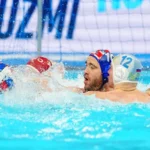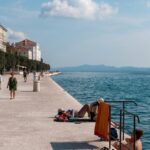ZAGREB, June 14, 2018 – Croatia’s 151-seat legislature on Thursday passed the Law on the Terminal for Liquefied Natural Gas, colloquially dubbed Lex LNG, by 77 votes in favour and 25 against, after weeks of heated debates on this topic in public and among experts and despite vociferous opposition of the local community on the Island of Krk and Primorje-Gorski Kotar County to the law.
Unhappy because the bill was put in fast track procedure, instead of having two readings, the Social Democratic Party (SDP) submitted 360 amendments, however they were all turned down.
The parliamentary debate over the amendments last week continued for almost six hours and ahead of voting on the amendments today, Parliament Speaker Gordan Jandroković suggested that in an effort to speed up the process, instead of MPs voting electronically they do so manually. “This was regular procedure before electronic voting was introduced,” he explained.
Even though SDP MP Arsen Bauk agreed, he asked that after every 30 amendments an electronic check be conducted to check the quorum.
MOST party MPs staged a walk out of parliament in protest of the ‘hasty’ voting method. They were later followed by independent MP Marin Škibola, Ivan Lovrinović (Let’s Change Croatia), Ivan Pernar (Živi Zid), former SDP MPs Mirando Mrsić and Zdravko Ronko.
Even though the initiative for the amendments came from SDP, at the start of the voting process, the majority of SDP MPs including leader, Davor Bernardić, vacated the parliament.
The Law on the Terminal for Liquefied Natural Gas regulates solutions for property and legal relations at the site for the terminal, issuing concessions for the coastal belt in order to construct the terminal and concession fees, defines the allowance for supply security.
The project envisages two stages – the construction of a floating terminal in the first stage and the construction of an onshore terminal for liquefied natural gas in the second stage.
Speaking earlier in the day, Minister of Environment Protection and Energy Tomislav Ćorić described the project as one of strategic interest, which would position Croatia on Europe’s energy map, while Tourism Minister Gari Cappelli ruled out detrimental effects of the terminal for tourist industry on the island.
Asked what he could say to activists who have announced the blockade of the Krk Bridge in protest to the future LNG floating terminal, Ćorić explained that the terminal is of strategic interest for Croatia and can position it on Europe’s energy map. Unlike those who are incorrectly claiming the opposite, the terminal will in the long term secure cheaper gas for Croatian consumers and increase supply security, Ćorić said.
Asked whether the LNG terminal or the protest rallies against its construction, particularly announcements that protesters would block the Krk Bridge, could impact the tourism season, Minister Cappelli said that he didn’t think so. “I don’t believe that it will be detrimental to tourism. I know that the LNG terminal will include state-of-the-art technology,” he said and added that there were polluters near the site of the future terminal that should be taken account of.
Transport and Infrastructure Minister Oleg Butković recalls that experts have said that the project was acceptable. “We all can have our own opinions. Experts have said that it’s OK,” Butković told reporters ahead of the cabinet meeting.







